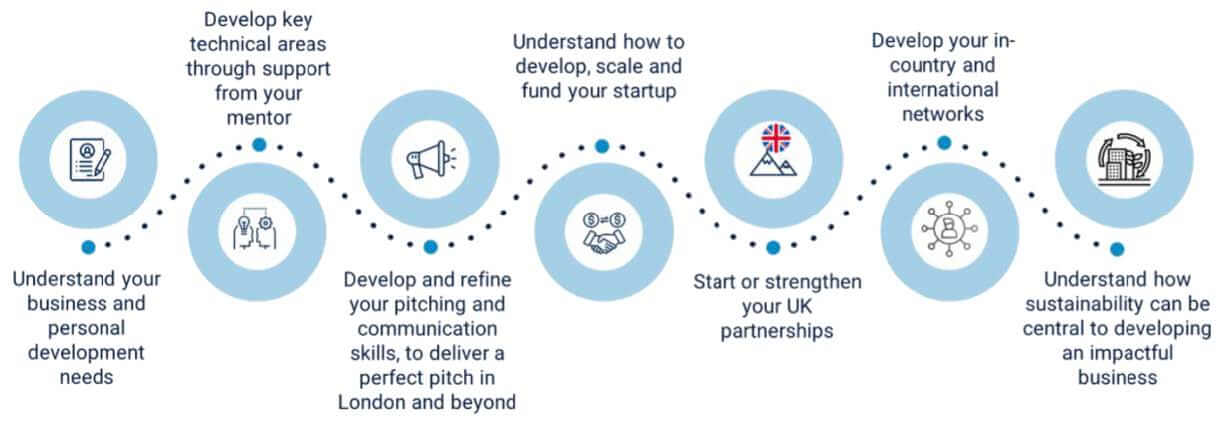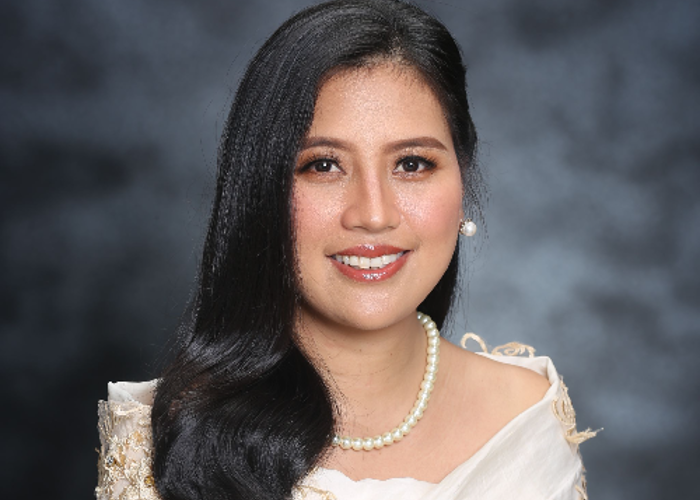LIF Global empowers innovators who are making a positive impact in their communities with novel technologies.
This programme is enabled by funding from the Department for Science, Innovation and Technology.
Explore the LIF Global programme below:

LIF Global business skills and personal development journey
The LIF Global programme provides innovators with opportunities to:
- Identify business and personal development needs
- Develop key technical areas with support from a mentor
- Develop pitching skills with an opportunity to pitch in London
- Develop, scale and fund your start-up
- Build partnerships and networks in the UK, in country and internationally
- Make sustainability an integral part of your business plan
LIF Global 2026 Timeline
| Timeline | Activity |
| December 2025 | Remote onboarding week |
| December 2025 to January 2026 | Individual diagnostic and induction, and self-guided deliverables |
|
December to June 2026 |
Remote training |
| January to March 2026 | In-country training |
| February to June 2026 | Remote mentoring |
| June to July 2026 | UK residential |
Online onboarding
Participants:
- Assess and build their entrepreneurial skills
- Develop your relationships with your fellow LIF participants, and trainers
In-country training events
You will join a 4-day training and mentoring event in your country, organised together with our in-country partner organisation
Aims:
- To contextualise learning to your country’s ecosystem
- To expand your networks of local experts and entrepreneurs
- To build engagement with alumni in your country
- To start developing and/or to strengthen your pitch deck
Individual diagnostic and online training
- 11 applied toolkit modules, across two levels ("Foundation Pillars" and "Advanced), covering topics such as business models, value proposition, finance, IP management, competitor analysis, business model innovation and pivoting, and marketing
- 5 masterclass training sessions covering topics such as delivering social impact inside and outside of your business, leadership and building a diverse team, and accessing global resources and internationalisation
- 3 remote pitching training sessions
UK residential
Participants:
- Travel to the UK for an in-person residential
- Participate in training and network-building events
- Pitch to an audience of investors and ecosystem leaders
Post-programme support
Participants:
- Benefit from a series of mentoring and networking options delivered by the Academy’s in-country partners
- Participate in the LIF Community
Eligibility criteria
Applications for LIF Global 2026 are now closed.
Applicants must be from one of the following countries to apply for LIF Global 2026: Brazil, Jordan, India, the Philippines, or Vietnam. Candidates must be in these countries during the time of the programme (December 2025 to July 2026).
*For Filipino applicants: please note, those attending LIF Launchpad Philippines in 2025 are ineligible to apply for LIF Global 2026.
We actively encourage applications from under-represented backgrounds and demographics. The Academy is committed to making reasonable adjustments to remove barriers that hinder participation. This can include things like child-caring responsibilities, physical accessibility, and more. If you have questions regarding this, please contact [email protected].
1. The innovation must be at technology readiness level 4 or above, and evidence of a prototype should be provided in the application.
Learn more about technology readiness levels
2. The applicant’s innovation can be any new product, technology or service, based on research in engineering defined in its broadest sense to encompass a wide range of fields, including, but not limited to:
- Agricultural technology
- Biotechnology
- Chemical engineering
- Civil engineering
- Computer science
- Design engineering
- Electrical and electronic engineering
- Materials science
- Mechanical engineering
- Medical engineering
Applicants do not need to have an engineering degree to apply.
3. Candidates must be the original innovator. If applicants already have a company, they must own shares in the company created. However, having a company is NOT a requirement at the time of the application.
4. The innovation should have the potential to benefit the applicant’s country, or other developing countries, in terms of improving social welfare and driving economic development, and they should contribute one or more of the UN Sustainable Development Goals.
5. The primary application of the innovation must NOT be in the defence, military, or fossil fuel-based energy sectors.
6. LIF alumni cannot apply to LIF Global 2026. They can, however, apply to Advance provided their technology are aligned with the programme's thematic areas,
7. Candidates cannot apply with an innovation/business that has been supported by LIF before (LIF 1 to 7, LIF Global 2022 - 2025). LIF Global supports businesses only once. In addition, co-founders can't both apply to LIF Global 2026 with the same business or technology.
8. Only one candidate per research team can attend the programme. If multiple individuals from the same team apply for the programme, they must collaborate on one single application. They will need to nominate a single representative to participate in the programme.
9. Applicants must be able to commit to LIF Global for
- a minimum of 4 hours during onboarding (week of 8 December)
- a minimum of 20 days for training and mentoring between January and July 2026, including 4 days (travel excluded) of in-person training in their country and 14 days for the UK Residential in July 2026.
This implies being able to secure permission from all relevant employers to attend the programme if selected. It also means making required arrangements for personal commitments. The Academy will provide relevant documents if required.
10. Applicants must be able to commit to travel internationally. All costs associated with the LIF Global programme will be paid for by the Royal Academy of Engineering, with the exception of visas and travel insurance.
11. Applicants will not need to cover any costs associated with the training programme in London, nor need to have any funds to support a trip to the UK.
12. Candidates will need to demonstrate fluency in English to participate. This will be a key assessment metric. Please note that the residential programme will be conducted entirely in English. Make sure to write your application and upload materials fully in English to avoid being penalised: most UK reviewers are native English speakers. Please note that the whole programme will be conducted entirely in English.
13. Applicants must be committed to LIF Global and Academy goals around sustainable development and responsible innovation.
14. Applicants must have a strong commitment to commercialisation. Though previous experience of commercialisation or involvement with technology transfer is not required, this criterion is essential to successfully completing the programme, and will be a key assessment metric.

